OPINION
Bryce Edwards
I am Political Analyst in Residence at Victoria University of Wellington, where I run the Democracy Project, and am a full-time researcher in the School of Government
The media is in crisis, as New Zealand audiences flee from traditional sources of news and information. The latest survey results on the public’s attitude to the media show plummeting trust. And New Zealand now leads the world in terms of those who want to “avoid the news”. But who or what is to blame for this striking and alarming trend?
The Shocking survey results about plummeting public trust in the media
Monday the annual report on Trust in news in Aotearoa New Zealand 2024 was released, containing statistics that the authors describe as “shocking”, and which others say should be a “massive wake-up call” for media. The report has been produced by the Centre for Journalism Media and Democracy (JMAD) at Auckland University of Technology (AUT), in collaboration with the Reuters Institute for the Study of Journalism.
The main finding is that public trust in the media continues to plummet: ‘In 2020, 53 per cent of New Zealanders said they trusted the news in general. In 2024, that figure was at 33 per cent. In five years, general trust in the news has fallen [20 percentage points].” One of the study’s co-authors, Merja Myllylahti, says she was “shocked” by the results.
The chart below shows the decline of trust in the media:
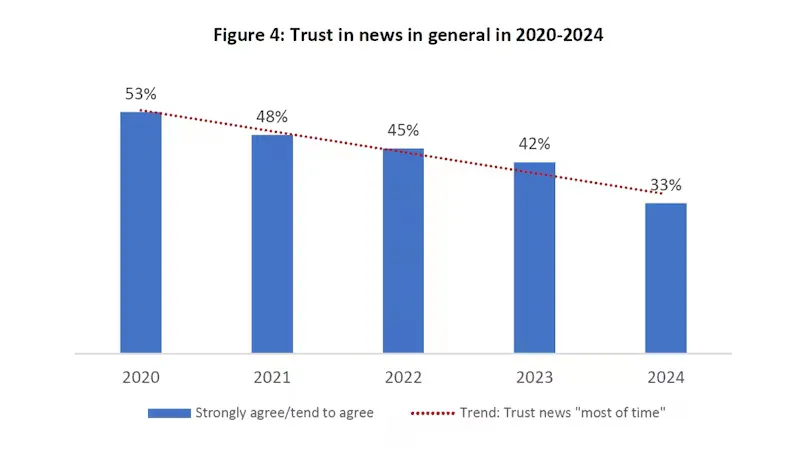
Generally, trust in the media has been declining all over the world. But in New Zealand that decline is much steeper than elsewhere. According to the authors of the report, the overall trust levels have dropped by 38 per cent in the five years the AUT study has been carried out.
For the first time, New Zealand’s trust score is lower than the global average of 40 per cent, recorded by Reuters Institute’s Digital News Report. And it’s now like that of the US (32 per cent) and the UK (33 per cent). See how other nations compare in the chart below:
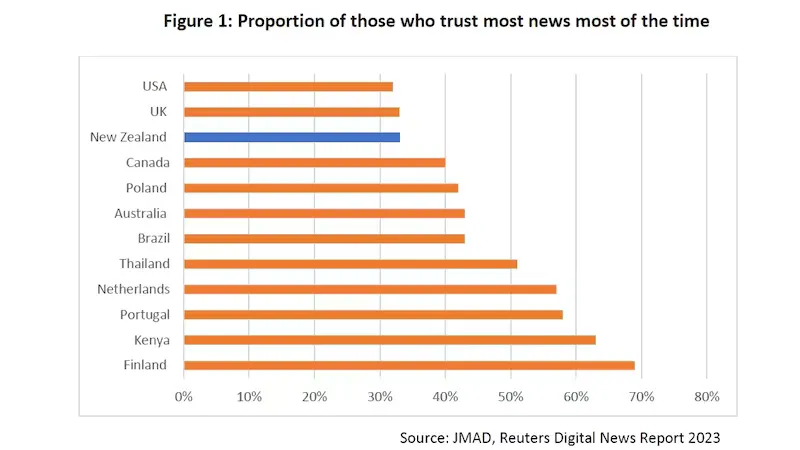
The survey also asked the public to rate the trustworthiness of the 16 main news media. None of them managed to score more than an average of 5 out of 10. The percentage of people trusting individual broadcasters has fallen particularly heavily: RNZ fell 7.5 per cent, Newshub 7.8 per cent, TVNZ 9.4 per cent, and Whakaata Maori TV 14.6 per cent.
Perhaps even more alarming is the proportion of New Zealanders who say they now avoid the news. Last year, the survey registered that 69 per cent say they actively avoid the news – making New Zealand the world leader in this trend. This year it’s got worse – now 75 per cent say they avoid the news. The international average is only 40 per cent, and the next most media-avoidant country is Greece on 58 per cent.
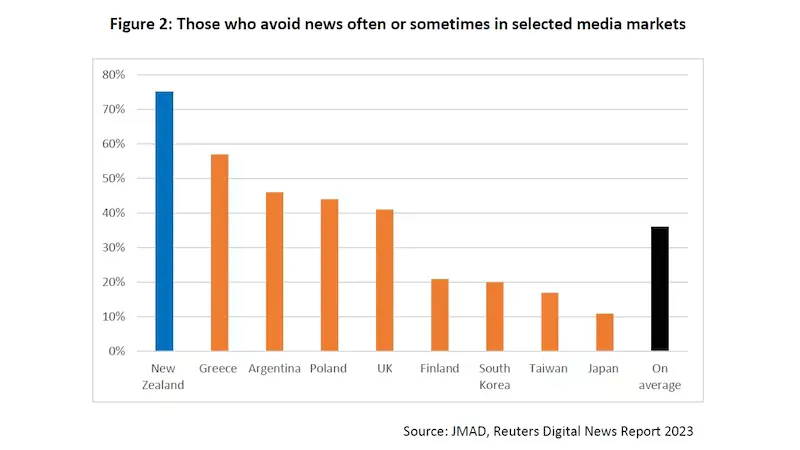
New Zealand’s world-leading media avoidance is made worse by the fact that New Zealanders are actually still very interested in news and information – over 70 per cent said they were interested in news to some degree
All of these trends are reiterated by another survey on public perceptions of the media, carried out in March by polling firm Rangahau Aotearoa Research New Zealand. You can the report here: In news we trust
Here’s their summary of the research findings: “Almost two-thirds of respondents (62%) stated they were personally concerned about ‘the falling trust in the news in general’. More specifically, 78% said they were concerned about the ‘spread of fake news and information’, while 64% said they were concerned about the quality of the news (which we defined as ‘in-depth analysis and the news being dumbed down’).”
You can see more answers to the questions in the chart below, including that 55 per cent of respondents are concerned about “freedom of the press” – defined as concerns about “the news not being censored”.

Late last year, the Global IPSOS polling company also asked New Zealanders about the professions that they trust. Unsurprisingly, the highest proportion of New Zealanders said they trusted doctors (65%) and teachers (61%), and only 21% said they trusted journalists. But the least trusted professions were politicians (17%) and “Advertisement executives” (14%) – see Trent Doyle’s Newshub report, The most trustworthy professions in New Zealand and other countries
Who or what is to blame for New Zealand’s distrust of the media?
The main AUT report on media trust provides some details of what the public says is their problem with the New Zealand media: “Those who say they don’t trust and/or avoid the news are most concerned about the negativity of news, including its impact on their mental health, and what they perceive as political bias and opinion masquerading as news.”
This is covered very well by RNZ’s Colin Peacock: “The report asked New Zealanders whether they believed that the news media ‘were independent of undue political or government influence most of the time’. Twenty-seven per cent agreed, but the proportion of those who ‘strongly or tend to disagree’ increased from 43 per cent in 2023 to 47 per cent. A quarter of respondents neither agreed nor disagreed. Eighty-seven per cent of those surveyed who did not trust news said it was ‘biased and unbalanced”, while 82 per cent said news reflected the political leaning of the newsroom and 76 per cent regarded news as “too opinionated, lacking in actual information’.” – see: People’s trust in news has tumbled over the past year, survey shows
The criticisms of the Public Interest Journalism Fund are also obviously resonating with the public. The $55m fund was established by the last government, and continues to fund a number of media projects. But it has been contentious with critics because it aligned with the Labour Government’s Te Tiriti agenda of change – it required all applicants to show a “commitment to Te Tiriti o Waitangi and to Maori as a Te Tiriti partner” — alongside a commitment to te reo Maori.
Hence, some believed this compromised the media outlets, encouraging them to report more sympathetically on Treaty and co-governance issues. And the AUT study shows that 59 per cent of the public appears to accept these sorts of critiques of the media, agreeing the statement that “government financial support for the media means you cannot trust journalists to hold the government to account”. Although the number was slightly down from last year’s 61 per cent, arguably it reflects the impact of the Public Interest Journalism Fund controversy.
Is “media bias” to blame?
The AUT survey suggests that the public blame the media for becoming less trustworthy. According to the report, “Those who say they don’t trust and/or avoid the news are most concerned about the negativity of news, including its impact on their mental health, and what they perceive as political bias and opinion masquerading as news.”
Respondents who did not trust the media were asked what factors had reduced their trust:
- 87 per cent believed the news was “biased and unbalanced”
- 82 per cent believed news reflected the political leaning of the newsroom
- 76 per cent regarded news as “too opinionated, lacking in actual information”.
In terms of bias, there’s some interesting evidence about the self-declared ideological leanings of journalists in Massey University’s Worlds of Journalism survey in 2022. It found that about two-thirds (65 per cent) of journalists identify as being leftwing, 23 per cent call themselves centrists, and 12 per cent say that are rightwing – see: Worlds of Journalism Study 2.0. Journalists in Aotearoa/ New Zealand
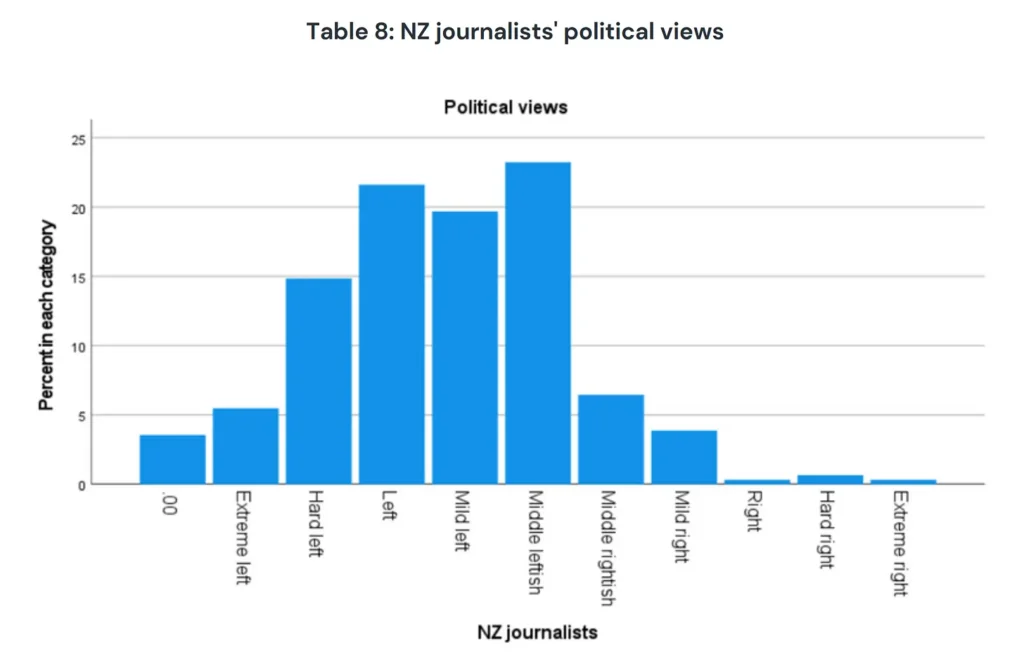
Some of this bias is also evident in a Curia Research survey carried out in December, which asked the question: “Do you think the New Zealand media overall are biased towards the right, biased towards the left or not biased?” – see: NZ media bias (paywalled)
The overall results were interesting: 37 per cent said the media was “Biased towards left” and 12 per cent said the media was “Biased towards right”, with another 31 per cent saying there was no bias, and 12 per cent not sure.
Similarly, the same research company asked the public to identify where on the left-right political spectrum each of the main media outlets was in April last year. The results suggested that the NZ Herald was the most politically balanced media outlet, with very similar left and right scores – see: NZ Herald rated as NZ’s most politically balanced media outlet
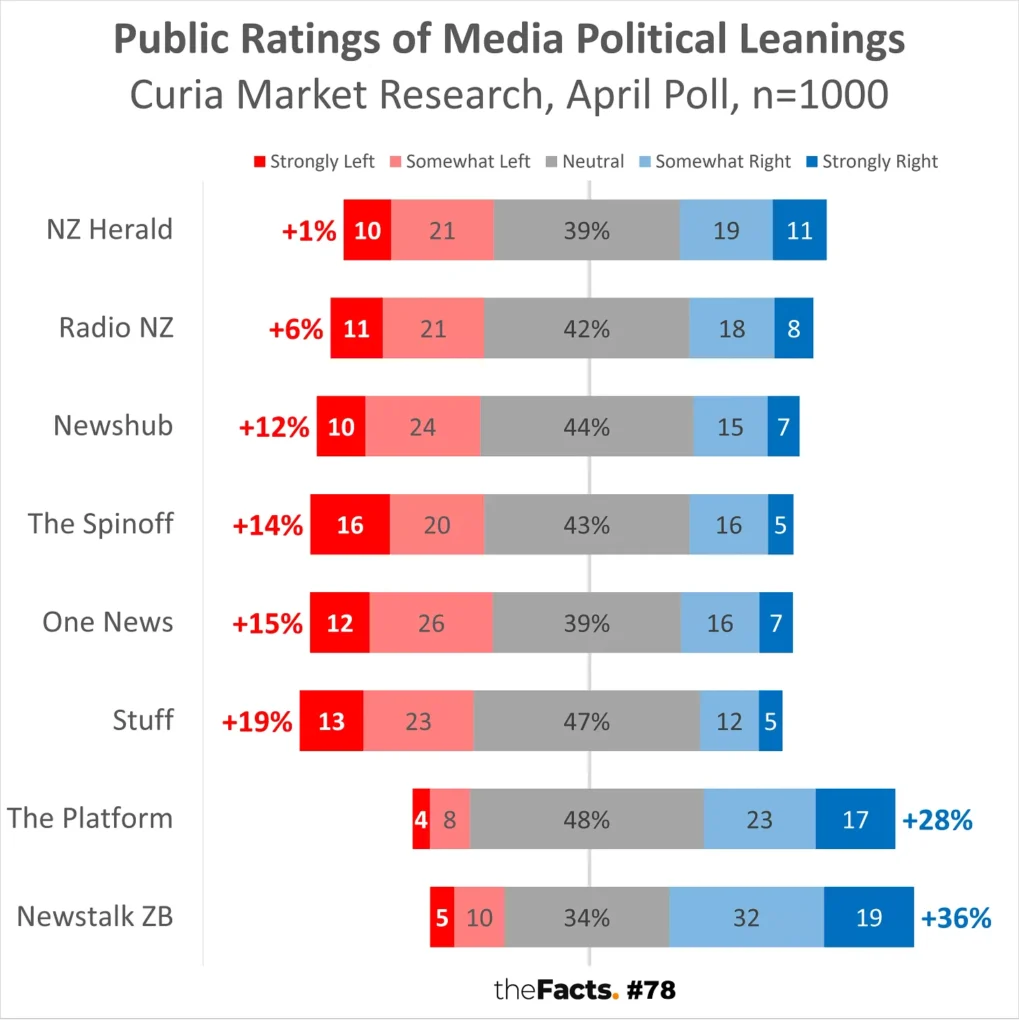
The alleged bias of the media was discussed by Newstalk ZB broadcaster Heather du Plessis-Allan, who says “we are seeing [the bias] play out right now, with this new Government being given absolutely no honeymoon whatsoever because their conservative, liberal and centre-right ideas are an anathema to left-leaning journalists, who rail against it every single day” – see: The media’s been given a wake-up call about bias
Media academic, and former editor of the NZ Herald, Gavin Ellis, has also written about yesterday’s media trust report, saying that the results “should shock the media sector”, and “Surely to God that sends a message to all mainstream, media that their approach to journalism has to change” – see: NZ media’s lab test results spell bad news
Ellis ponders whether, rather than bias, it’s the media’s overwhelming negativity that is the problem: “I went back and reviewed the front page lead stories of our metropolitan papers published last year and found that, with only irregular glimmers of hope, they were unremittingly negative. A third of the New Zealand Herald’s lead stories in that period were crime related… Unrelenting gloom is something we shy away from. And, if we see media painting an exaggerated picture that does not reflect our own reality, our trust in them is also likely to diminish.”
He also points to the fact that the Otago Daily Times has the highest trust rating in the survey, which Ellis says is significant because that newspaper “takes a more traditional or measured approach to selection and presentation” of news.
But will those in the media accept their faults, or just blame others?
Last year I talked to a head of one of the top media outlets in the country, during which I asked about the public’s perception of bias at the company, and whether they thought it was a problem that their media company was perceived in a certain way. I was surprised to hear that this was news to them – they said that they had never received such feedback. They weren’t denying that this might be a problem, just that they had never been told this before.
Sometimes institutions and those in them suffer from “living in a bubble”, and can get out of sync with the public mood. This is a major problem if it’s true, as playwright Arthur Miller once said, “A good newspaper, I suppose, is a nation talking to itself.” Instead, it might be alleged that journalists are just talking to themselves and other elites, and when they talk to the nation, they are talking down to them.
Similarly, Heather du Plessis Allan says that she thinks that journalists and broadcasters will simply reject this latest landmark survey and the notion that the media has a trust problem: “I genuinely think newsrooms up and down this country don’t believe this is true. That is my experience of talking to editors in various media. They don’t see it, or they do and they make excuses.”
Blaming social media, politicians, and the public

